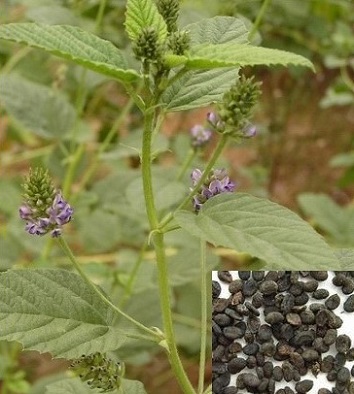Herbs And Phytochemicals: Bavachin From Psoralea Corylifolia Rejuvenates Sensitivity Of Colistin Against Drug-Resistant Gram-Negative Bacteria
Nikhil Prasad Fact checked by:Thailand Medical News Team Feb 17, 2024 1 year, 11 months, 2 weeks, 3 days, 9 hours, 21 minutes ago
Herbs And Phytochemicals: Antibiotic resistance poses a significant threat to global public health, rendering traditional treatments ineffective against multidrug-resistant Gram-negative bacteria (MDR GNB). The rise of plasmid-mediated colistin resistance further exacerbates the challenge, limiting clinicians' choices for effective antibiotics. With the scarcity of new antibiotics, exploring adjuvants to enhance the efficacy of existing antibiotics presents a promising strategy. In this context, bavachin, a bioactive compound extracted from Psoralea Corylifolia seeds, emerges as a potential candidate to rejuvenate the sensitivity of colistin against drug-resistant Gram-negative bacteria according to a new
Herbs And Phytochemicals study conducted by researchers from South China Agricultural University, Guangzhou-China.
 Bavachin From Psoralea Corylifolia Rejuvenates Sensitivity
Bavachin From Psoralea Corylifolia Rejuvenates Sensitivity
Of Colistin Against Drug-Resistant Gram-Negative Bacteria
Background on Antibiotic Resistance
Multidrug resistance in Gram-negative bacteria, including Escherichia coli, Salmonella typhimurium, Klebsiella pneumoniae, Pseudomonas aeruginosa, and Acinetobacter baumannii, has rendered many antibiotics ineffective. The global impact of multidrug-resistant bacteria infections is alarming, with over 700,000 annual deaths attributed to such infections, and projections suggesting a potential increase to 10 million by 2050 without effective control. Plasmid-borne colistin-resistant mcr genes in Gram-negative bacteria further limit treatment options, leaving colistin, a last-resort antibiotic, as one of the few available choices. However, clinical usage of colistin is constrained by nephrotoxicity and neurotoxicity, necessitating alternative strategies to combat these infections.
The Promise of Combination Therapy
In response to the growing threat of antibiotic resistance, the exploration of natural products and traditional Chinese herbal ingredients has gained prominence in the search for new antibiotics or antibiotic alternatives. These plant-derived compounds offer rich structural diversity and have demonstrated antibacterial properties. Bavachin, a flavonoid extracted from Psoralea Corylifolia, has been recognized for its multifaceted pharmacological activities, including anti-obesity, anti-inflammatory, anticancer, and immunoadjuvant effects. While previous studies have demonstrated bavachin's antibacterial activity against Gram-positive bacteria, its potential synergistic effect with colistin against Gram-negative bacteria remains unexplored.
Synergistic Antibacterial Activity of Bavachin and Colistin
The study investigates the synergistic antibacterial activity of bavachin when combined with colistin against MDR Gram-negative bacteria. Bavachin, alone, exhibits no antibacterial activity against Gram-negative bacteria. However, when combined with colistin, the minimum inhibitory concentration (MIC) values of colistin decrease significantly, indicating a universal synergistic effect across various tested stra
ins, including E. coli, K. pneumoniae, and S. typhimurium. Importantly, the combination demonstrates negligible hemolytic activity, suggesting bavachin's potential as a colistin adjunct without evident toxicity.
In Vitro Evaluation of Synergistic Activity
To further assess the synergistic activity in vitro, the study employs time–kill assays on mcr-positive and mcr-negative bacteria. The combination of bavachin and colistin proves highly effective in reducing bacterial counts, surpassing the individual effects of each compound. Notably, the combination therapy demonstrates a rapid bactericidal effect within 4 hours, emphasizing the potency of bavachin as a colistin adjuvant.
Impact on Bacterial Biofilm Formation
Bacterial biofilm formation is a critical factor contributing to antibiotic resistance. The combination of bavachin and colistin significantly reduces bacterial biofilm formation compared to colistin alone. Additionally, the combination inhibits bacterial motility, revealing a comprehensive approach to combat antibiotic resistance by targeting biofilm-associated mechanisms.
In Vivo Therapeutic Efficacy
The study extends its investigation to in vivo models, utilizing Galleria mellonella larvae and mouse sepsis models. The combination of colistin and bavachin significantly improves the survival rates of infected larvae and mice compared to monotherapy with either agent. This enhanced therapeutic efficacy is accompanied by a reduction in bacterial burden in various organs, emphasizing the potential of bavachin as an adjunct to colistin in treating drug-resistant bacterial infections in vivo.
Mechanistic Insights into Synergistic Activity
To unravel the synergistic mechanism, the study explores the impact of bavachin on mcr-1 transcription, a plasmid-borne colistin resistance gene. Bavachin exhibits a dose-dependent inhibition of mcr-1 transcription, suggesting its potential role as an inhibitor of this resistance mechanism. Molecular docking studies predict binding sites of bavachin on the MCR protein, providing insights into the potential interaction between bavachin and key amino acid residues.
Enhancement of Membrane-Damaging Activity
While bavachin alone has no effect on the cytoplasmic membrane (CM) of Gram-negative bacteria, its combination with colistin significantly enhances membrane damage. Observations through scanning electron microscopy reveal indentations and dissolution on the bacterial surface, indicating structural damage to the cell membrane. Further assessments using a fluorescent probe for CM permeability confirm the disruptive effect of the combination, leading to increased intracellular ROS levels.
Conclusion
The study establishes bavachin from Psoralea Corylifolia as a potent adjuvant to colistin, demonstrating remarkable synergistic antibacterial activity against drug-resistant Gram-negative bacteria both in vitro and in vivo. Bavachin enhances colistin sensitivity, reduces bacterial biofilm formation, and inhibits mcr-1 transcription, providing a multifaceted approach to combat antibiotic resistance. The proposed combination therapy not only offers a promising strategy to address the challenges of MDR bacteria but also presents a potential avenue for lowering colistin dosage, mitigating its toxic side effects. As the global healthcare community grapples with the escalating threat of antibiotic resistance, the discovery of bavachin's role as a colistin adjuvant opens new possibilities for effective and sustainable antibiotic therapy.
The study findings were published in the peer reviewed International Journal of Molecular Sciences.
https://www.mdpi.com/1422-0067/25/4/2349
For the latest on
Herbs And Phytochemicals, keep on logging to Thailand Medical News.
